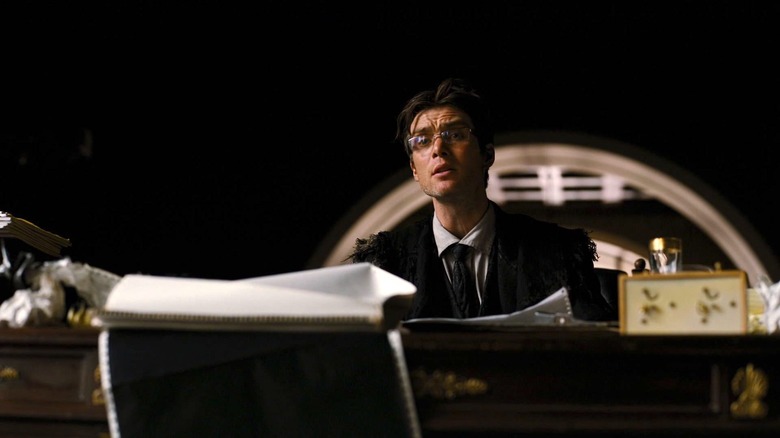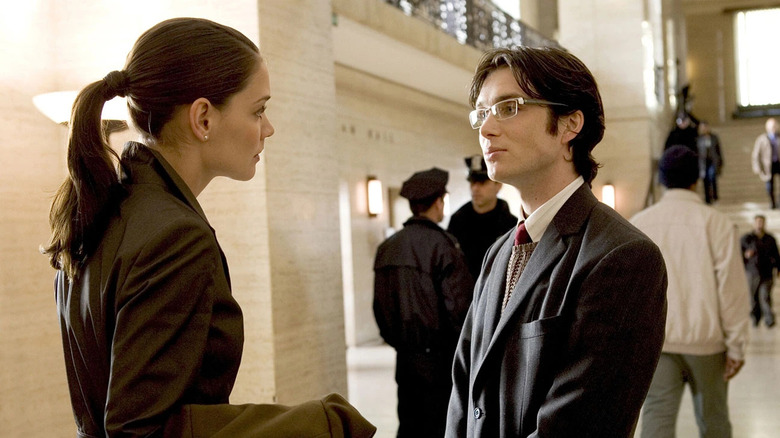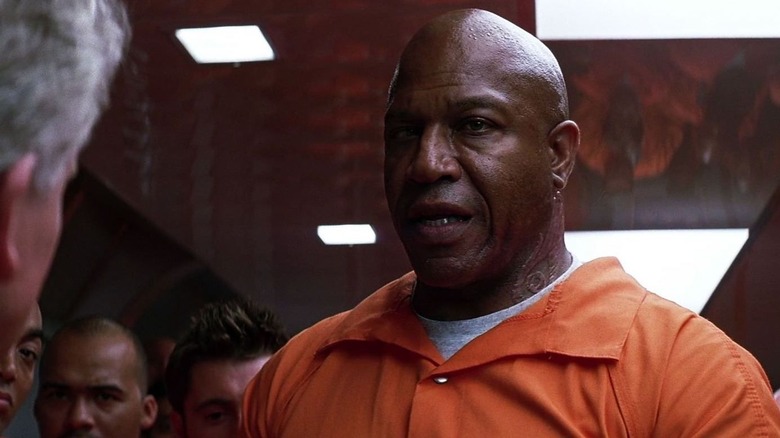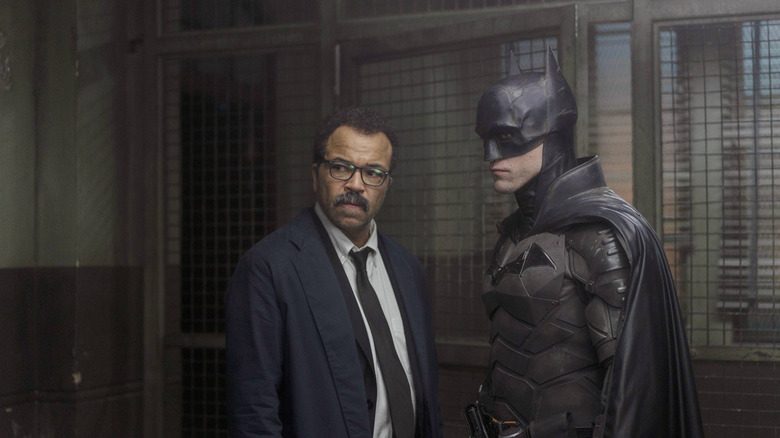Cillian Murphy Appreciates One Key Element Of The Dark Knight Trilogy Over More Recent Superhero Movies
As superhero movies become increasingly interconnected, Christopher Nolan's "Dark Knight" trilogy already feels like a relic of a bygone era. It was a trilogy that stood entirely on its own. You didn't need to watch any other DC films to understand what was going on, nor did the movies end up needing to be watched to understand later DC films. We simply got three solid movies that took themselves seriously while still being entertaining. Whereas pretty much everyone's suffering from at least a little Marvel fatigue at this point (with their multiple movies and tv shows per year), every single "Dark Knight" film — released three to four years apart — felt like a proper event.
For Cillian Murphy, who played Jonathon Crane (aka Scarecrow) in all three movies, there's another key difference that separates these films from the superhero movies of today: none of the characters have superpowers. "It's a slightly heightened level of storytelling, where New York is Gotham, and no one did anything magical," Murphy said. "I think they're so grounded in a relatable reality."
Admittedly yes, Bane's whole "threatening to blow up Gotham with a nuke" plan was a little overdramatic, but it was still far more grounded than what typically happens in a Marvel movie. Because nobody has powers, the stakes feel higher. And because the movies are mostly limited to a single city, the villains' threats feel more believable compared to, say, the humanity-destroying threat of "Eternals." When Gotham's held hostage for five months, the viewers can feel the effects of that on Gotham citizens in a way we never did for the residents of New York City at the end of "The Avengers."
Movies with actual things to say
Murphy's "Anthropoid" co-star Jamie Dornan also gave his thoughts on modern superhero movies, saying, "Do you remember when you were a kid, and you used to go, like, 'Who would win in a fight, Batman or Superman?' That's exactly what studios are doing now ... It's like a day at the playground." And, well, he's not wrong. Despite Zack Snyder's attempts to establish an ever darker, grittier tone with "Batman v. Superman," at the end of the day the movie was basically what Dornan describes.
The "Dark Knight" trilogy, meanwhile, is an example of three comic book movies with something real to say about the world we live in. They were surprisingly mature for their time, and even more so by today's standards. Probably the most impressive choice in the trilogy is the decision to center the third act of "The Dark Knight" around a hostage situation with two ferries. It's not the whole city potentially being blown up; it's a group of civilians and a group of prisoners, none of whom we've met before.
At first glance, it might sound like a bad choice to make the stakes so low, but it works because unlike Thanos blipping away half the universe for good, there's a legitimate chance Batman won't be able to save both ferries. If one or both of them blows up, the movie can still continue. A sequel is still easily possible. Not only is the outcome genuinely uncertain, but the whole plot point ties into the movie's overarching thematic conflict between Batman and the Joker: are people inherently good or bad?
A trilogy that embraces complexity
The Joker is often over-simplified as a guy who's evil "just because." Heath Ledger's Joker is often taken at face value when he says he doesn't really have a plan. But while this Joker certainly does want to watch the world burn, he does in fact have a cohesive motivation behind doing so: he wants to prove that people are bad, that everyone is one terrible day away from becoming just like him. It's a motivation explored often in the Batman comics, with "The Killing Joke" in 1988 being one of the clearest examples.
"The Dark Knight" is all about that question, and it ends on a somewhat ambiguous note. After all, the Joker is seemingly proven right with the resolution of Harvey Dent's (Aaron Eckhart) character arc, as well as the fact that he's able to strong-arm so many of Gordon's officers into helping him. But it's with the ferry scene that the movie gives us the clearest counter-argument to the Joker's philosophy. Even though everyone on both boats had a clear personal incentive to blow each other up, neither of them did. They made the moral choice even under extreme pressure, and it's one of the few moments in the movie where the Joker seems honestly upset. For the first time, something didn't go according to his plan.
The way the themes, plot, and multiple character arcs are intertwined in the final third of "The Dark Knight" is leagues above any superhero movie of the past ten years. Then again, it's not clear how much of this was the result of a lack of superpowered characters, or if a movie of this caliber is even possible in a story with clear sci-fi/fantasy elements.
Can Matt Reeves hit the same heights?
"The Batman" was released earlier this year, and although it didn't quite reach the level of "The Dark Knight," it was still a strong start to a new version of the character. It was a movie with actual things to say about government corruption, not to mention wealth inequality and the way it can cloud one's perspective on what justice should look like. The movie's version of the Riddler (Paul Dano) is a man with a legitimate bone to pick with the people he kills.
At the same time, "The Batman" is a movie that feels less realistic than the way Cillian Murphy describes the Nolan trilogy. Yes, there technically aren't any characters here with superpowers, but with the delightfully over-the-top gothic feel of the city and the extra comic book-y elements, it's not hard to imagine superpowered characters showing up in the sequel. It's been a while since we've gotten a live-action portrayal of someone like Poison Ivy or Mr. Freeze, after all, and those characters might fit in well with the universe Reeves' has created.
Details for the sequel are still unclear (especially with recent news about a DC reboot), but if they choose to include some of the sci-fi or fantasy elements from the Batman comics, it'll be interesting to see how it turns out. Cillian Murphy may consider the lack of magic in the Nolan universe to be a positive element, but the same might not be true for this new version of Gotham. Is it possible to achieve the heights of Nolan's trilogy with superpowered characters? Maybe we'll get to find out.



